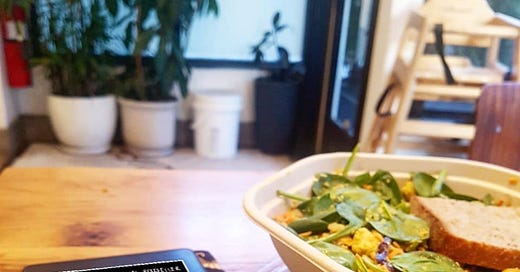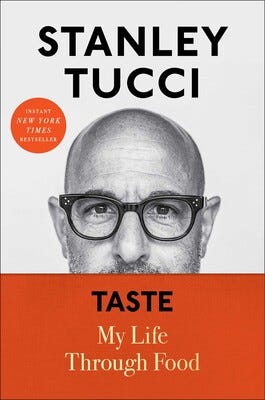Hi and welcome to a whole new month of the Storyteller! I can’t wait to share what I’ve got planned.
Today I have a reading update, my first entry for Character Study (aka Fictional People I’ll Never Forget), and a few other bits and bobs, so let’s dive right in.
A Taste of my current read
Any Tucci fans in the house, she asks, as she waves her hand above her head?
Here is what his publisher has to say:
From award-winning actor and food obsessive Stanley Tucci comes an intimate and charming memoir of life in and out of the kitchen.
Before Stanley Tucci became a household name with The Devil Wears Prada, The Hunger Games, and the perfect Negroni, he grew up in an Italian American family that spent every night around the table. He shared the magic of those meals with us in The Tucci Cookbook and The Tucci Table, and now he takes us beyond the recipes and into the stories behind them.
The book is a reflection on the intersection of food and life, filled with anecdotes about growing up in Westchester, New York, preparing for and filming the foodie films Big Night and Julie & Julia, falling in love over dinner, and teaming up with his wife to create conversation-starting meals for their children. Each morsel of this gastronomic journey through good times and bad, five-star meals and burnt dishes, is as heartfelt and delicious as the last.
I’m only three chapters in but it is already bubbling over with his trademark charm, and I fully plan to take it slow and savour. (I’ve been told more than once—shoutout Namrata—that I’d love the audiobook which he narrates himself, and I must say that I am rather tempted to sign up for an Audible trial just for this.)
One of my highlighted quotes so far (about his maternal grandfather’s home wine press):
At any rate, those of us lucky enough to be present swelled with pride as the cloudy purple liquor was carried upstairs to the table in its decanter, poured into juice glasses, toasted with, and drunk heartily. Was it the best wine in the world? No. Was it the worst? Very close. Did it matter? No. It was part of my grandfather, whom we adored, and that made it the sweetest liquid ever to pass our lips.
Character Study #1
This inaugural edition of Fictional People I Will Never Forget takes us to Nazi Germany, just outside of Munich.
I first met Liesel Meminger, our young protagonist, in the summer after I graduated junior college. Back in the day, especially in a place like India, your only way to discover new books was to browse through the entire bookstore. The Book Thief was one of my sister’s discoveries (The Shadow of the Wind would be another, a few years later); it was unlike anything we’d ever read, despite our voracious way with books.
For starters, Death is the narrator. Yes, Death.
In the introduction, while you are still getting used to this unusual narrator, Death says that it is telling us Liesel’s story as “an attempt—a flying jump of an attempt—to prove to me that you, and your human existence, are worth it”. It also clarifies that it is just the one that collects dear, departed souls, not the one who separates those souls from the actual bodies; that is a result of the worst kind of human instincts, of the horrible horrors they are capable of on their own kind.
It’s a heavy topic even for an adult book, but more so for a narrative classed as YA Fiction. Zusak’s quiet prose creates a nuanced and haunting narrative that sidesteps the heavy and will remain with us long after we turn the last page. With his inventive use of an omnipresent narrator, the story becomes one of every single person who has lost someone in a war, or through mass cruelty. It becomes our story, part of our shared consciousness.
In Liesel, the young foster girl, we have a very likeable, spirited, and sensitive protagonist. She is one of my favourite literary characters; a fighter like all of Zusak’s characters. The words in her books offer her hope, hope of a better tomorrow, and she in turn empowers others by small acts of defiance against the Nazi rule—she shares the books that she steals, from the mayor’s wife’s library and even from Nazi burnings of banned books, with her neighbours during bombing raids, quietly reading them out; anything to occupy their minds from more troublesome thoughts.
I reread this for the nth time back in January 2020 when, for personal reasons, I gravitated towards the complicated sadness and catharsis of emotion a book like this offers. It was the first time I've taken my time reading it and it made me realise just how long it takes to get to many of my favourite parts. How what comes to mind when I think of the book, the parts that remain vivid and tower over the rest, are actually a small part of the whole. They seem to last longer in my mind but feel even faster when I do read them again. What I did enjoy during the reread, because of taking my time, were the little moments I had forgotten or overlooked. I also realised, perhaps for the first time, how patiently and carefully Zusak builds up characters that, later, seem effortlessly multi-faceted.
Whether my favourite, the lovely Papa Huberman with eyes of kindness and silver, or the incorrigible lemon-haired Rudy who never fails to step on my heart, the prickly Rosa who hides a strong and generous heart beneath her fury, or even the gentle Jewish fist-fighter Max who, I now notice, is only 24, someone who seemed so grown up when I first read this as a teenager. These characters, along with the (sometimes overwritten, mostly lovely) prose, elevate just another WWII story into a sprawling meditation on the power of words, on love, struggle, courage and loss.
The story is about the power of words in a time when there was little hope. It’s about the kind of immovable hope that refuses to budge or back down even in the face of the worst kind of everything. It’s about fate, chance encounters, and how small events can have a ripple or domino effect on the ones to come.
The Book Thief could have been better edited in parts to have a stronger impact (especially in instances that stray off-topic or break the main narrative thread), but the many compelling bits override all of this. With its symbols, illustrations, handwritten bits and inherent innocence, it feels like a realistic rendering of a story that is ultimately about a young girl who, at her very core, is desperate to read as much as she can despite being surrounded by an environment where bombs, death, starvation are daily themes.
“… it’s the kind of book that can be life-changing, because without ever denying the essential amorality and randomness of the natural order, The Book Thief offers us a believable, hard-won hope.” (The New York Times, 2006)
The main difference during my latest reread was the end. For the first time, I was truly inconsolable. Clearly, the older I am when I revisit this beautiful, heartbreaking book, the more haunted I am.
Still a favourite? Absolutely ❤
Have you read the book? Do you want to read it? Let me know in the comments.
This weekend, I’m also starting a buddy read of Small Worlds by Caleb Azumah Nelson with a friend. If you remember, it’s an anticipated 2023 release for me—thank you to Grove Atlantic and Netgalley for making the ARC available to us! The book comes out in May 2023 so stay tuned for our thoughts.
As always, please feel free send in recommendations—books, movie, TV shows, authors to interview, ideas of what you’d like me to write on, rants/ramblings/excited monologues, GIFs and memes (especially them) and more. Just drop me a line and turn this into a conversation, even if just to say hi and let me know what you thought of the latest issue :) Or share this with someone you think might enjoy it.
Thank you for reading and see you next week!
Anu
If you really like the newsletter, please feel free to buy me a coffee: https://ko-fi.com/anushreenande
You can find me on Twitter at @AnuNande (follow for all the football chatter) and on Instagram at @booksinboston.





